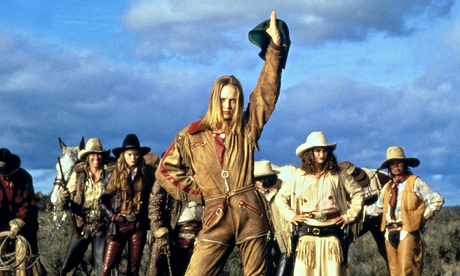
A great heroine, for me, is not necessarily likable or admirable. I look for female characters who are allowed to inhabit their own spaces, women who are allowed to be entirely themselves without any outside constraints. Often, these women are nowhere near perfect, but I find them more admirable for that. The virgin/whore dichotomy has been a powerful force in literature for a long time, but I’m always on the lookout for characters who are allowed to be more complicated than that – to be like real women. I could have expanded this list into the hundreds, but here are 10.
VI Warshawski (VI Warshawski novels, Sara Paretsky)
If you don’t know Warshawski, go out and buy Burn Marks or Guardian Angel and get acquainted. Paretsky’s mysteries are well-crafted, but for me, the whodunit is simply icing on the cake – it’s her protagonist that is extraordinary. Warshawski constantly faces everyday problems such as paying the bills, dealing with difficult neighbours, getting her daily exercise, battling casual (and not-so-casual) sexism, classism and xenophobia, managing family crises and managing her own temper; but, at the same time, she bravely combats the larger problems of corporate and governmental overreach. In a world that often tries to squash her flat, Warshawski is a street fighter defending the little guy. She is a fully three-dimensional heroine, and a wonderful role model for everyone.
Hermione Granger (Harry Potter novels, JK Rowling)
I can’t imagine anyone needs an introduction to Hermione, but I am constantly charmed by her character: brilliant, proud, loyal, courageous, unflinchingly ethical and most of all confident that the answer to any question can be found in a book. For me, some of Rowling’s most brilliant authorial choices come when she presents Hermione with problems that can’t be solved by spending a few hours in the library. The resulting crisis of character is fascinating.
Scarlett O’Hara (Gone With the Wind, Margaret Mitchell)
This amazing character has myriad flaws, and if I met her in real life, I’m sure I would loathe her. But as a reader, I can’t stop cheering her on. Scarlett O’Hara is both very smart and incredibly stupid, but she is also an honest woman in a world that values artifice, tough in a world that values feminine weakness. She is one of the great iconoclastic characters, and I love her dearly.
Dolores Claiborne (Dolores Claiborne, Stephen King)
With every re-read (there have been many), I’m struck all over again by how far King was able to voyage inside a woman’s head and capture her voice. I fully believe that Claiborne is a real woman, living and breathing and thinking on an island off the Maine coast. Her life is not easy, and her choices are painful, but she meets all of it head-on with a pragmatism that is refreshing in a female protagonist. I also give King high marks for something I don’t see nearly often enough in literature: heroic women allowed to freely use profanity. We need more of that.
Sethe (Beloved, Toni Morrison)
If I could, I would make everyone read Beloved. Sethe has gone through hell, come out alive on the other side, and then found that the journey is far from over. Her story demonstrates that even when we think we have finished with the past, the past isn’t finished with us. Morrison chronicles this problem better than any author I’ve ever read; Sethe is trapped in her terrible history, and the reader is trapped there with her.
Lisbeth Salander (the Millennium trilogy, Stieg Larsson)
It’s hard to quantify what makes Lisbeth Salander is so compelling. She is an outcast, and it affords her a freedom that women are seldom allowed in literature. She obeys no laws beyond those of her own self-preservation and follows a twisted yet strangely accurate moral compass. She is like a human juggernaut.
Sissy Hankshaw (Even Cowgirls Get the Blues, Tom Robbins)
Most authors would take a character’s childhood deformity and use it as the foundation for a moving tale of healing and acceptance. Not Tom Robbins. Sissy Hankshaw not only embraces her gigantic thumbs, she builds an entire identity around them, then spends the novel fighting to keep that identity intact. This book contains wonders, but it would be lost without Sissy, a force of nature on the side of the road.
Victoria McQueen (NOS4R2, Joe Hill)
Joe Hill’s female characters are impressively three-dimensional, but The Brat, Victoria McQueen, is head and shoulders above the rest. She’s a tough, imperfect woman with a serious self-destructive streak, and Hill allows that streak to play out in full. At many points, I actually expected Hill to curb her personality in order to facilitate a more linear plot, but it never happened. Childhood to adulthood, McQueen is entirely herself.
Eleanor Vance (The Haunting of Hill House, Shirley Jackson)
Ah, Eleanor. She’s a piece of work: socially inept, utterly self-centred and not quite on the same planet as the rest of us. But by God, she is consistent. She is allowed to be her own flawed self, even while the reader is mentally begging her to get it together. Vance goes through monstrous psychological contortions in order to maintain her self-image as the hero of her own life, and the process is wonderful (and maddening) to watch.
Lee Fiora (Prep, Curtis Sittenfeld)
Fiora is one of the most honestly written characters I’ve ever encountered. I often lack the courage to put my characters in socially uncomfortable places, situations where they will look ridiculous or feel humiliated; I simply can’t bring myself to go through it. Sittenfeld, by contrast, goes all in, and I felt agony for Fiora in this great novel.
• The Invasion of the Tearling by Erika Johansen is published by Bantam.

